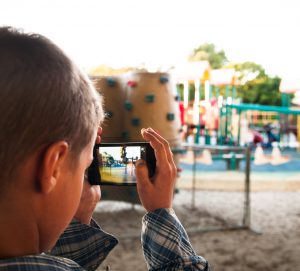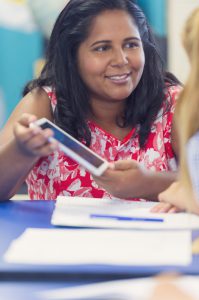Be alert not alarmed
Fear of digital devices including iPads for young children is an ‘archetypal moral panic’, according to Professor Nicola Yelland, currently at Flinders University in South Australia and heading for the role of Professor of Early Childhood Studies at the University of Melbourne in 2019.
Amplify editor Bec Lloyd interviewed Prof Yelland about her recent paper on this subject and why we should be alert, not alarmed, about digital devices in early childhood education.
…this discovery of yours will create forgetfulness in the learners’ souls, because they will not use their memories; they will trust to the external written characters and not remember of themselves.
– Socrates, relaying a story from Egypt about the invention of writing.
Every generation faces the impact that change will have on its children. It’s in our nature as humans to improve things, and share the improvements for the betterment of others. However, it’s also in our human nature to be suspicious of change and ever more fearful of the pace at which change now travels.
Educators from early childhood to university have had to grapple with the impact of technology on pedagogy.
While universities worldwide led the creation of a publicly accessible internet – a spectacular solution to real-time knowledge sharing – it wasn’t long before the internet was posing enormous threats to the quality of tertiary student learning via online plagiarism in myriad forms. The internet opened up university study to more people than ever before, but only if you could afford to be connected (hello there, NBN policy!)
Schools suffered the same way, dealing with more and more problems relating to technology in learning (pen-sized scanners, equitable use of computers) while also trying to keep up with an unprecedented influx of teaching and learning opportunities through new devices, new platforms, and new ways of thinking.
Early childhood screen philosophies
In early childhood, as in other forms of education, social and technological changes can’t be ignored. In 2018, the ECE sector falls broadly into three types of technology pedagogies:
- No screentime. In these services the philosophy is that children are already highly exposed in their homes and communities so their time with the service offers a complete break from digital connections.
- Highly controlled screentime. Older children might be settled in front of Playschool on the ABC each morning, or there might be strictly limited access to iPads, cameras or desktop computers linked to specific educational programming.
- Relaxed access to screens. In these services digital learning may be embraced as part of a philosophy reflecting the society in which children are raised. iPads and desktops may be plentiful, and many forms of learning will include a digital mode such as filming or app-based games or stories.
How does your service philosophy treat screen time and digital devices?
Share it with us in the comments below
Right or wrong
Is there a right or wrong approach? It’s hard to say at this point when research can be found to support or oppose screen use for very young children. Many educators still flounder for an answer that will present a clear direction, whether that’s a yes, a no, or even a well-described ‘sometimes’!
So Professor Nicola Yelland’s most recent research paper may be a comfort. Available without subscription, the paper, ‘A pedagogy of multiliteracies: Young children and multimodal learning with tablets’ (September 2018) by NJ Yelland, has been published in British Journal of Educational Technology (Wiley Online) Vol 49, 5, pages 847-858. DOI: 10.1111/bjet.12635
In the research she has sought to answer how, from paper to iPads, do children become literate in the 21st century? Additional questions include whether school systems are truly prepared for the kinds of literacy young children now bring to them from their early years, and what role family socio-economic status plays in this new multi-modal literacy.
This idea that we’ll all be ruined because children are learning from iPads is utterly predictable.
What is literacy in 2018?
 Multimodal learning makes use of print, digital, personal and other communication
Multimodal learning makes use of print, digital, personal and other communication
Prof Yelland finds young children are fluent in both new and older technologies such as books, blocks and crayons, and can apply them interchangeably.
An example she gives from her research involves children being inspired by stories from print and digital media and their garden explorations, then filming and drawing their concepts, which were turned into print posters with Q Codes. The Q Codes, when accessed with a service-based iPad, would then pull up more of the video and images the children had taken digitally and this enhanced their memories and understanding of their past learning in a rich and unique way for each child.
That example was undertaken with pre-school aged children who would, Prof Yelland says, then proceed to school systems which favour traditional print-based literacy practices and resources such as paper and pencils.
Technopanic
Fears about young children using screens are, Prof Yelland believes, ‘absolutely archetypal moral panic’.
‘This idea that we’ll all be ruined because children are learning from iPads is utterly predictable,’ she says.
‘Of course they shouldn’t be spending all day every day on screens – that’s just common sense!
‘But children learn from everything and their world includes screen delivered information, we cannot ignore it and hope it goes away.
‘We have to embrace the digital as one of many forms of learning and what our research showed is there are enormous benefits for children when their educators understand and adopt multimodal learning.’
For handwriting placed on parchment will be able to endure a thousand years. But how long, forsooth, will printing last, which is dependent on paper? For if in its paper volume it lasts two hundred years that is a long time.
– The Abbot Trithemius (1462-1516). Trithemius also warned that printing presses would make monks lazy, reduce their understanding of and devotion to scriptures, and discourage reading because the texts would not have the attractive personal flourishes of hand copied works.
Transition gaps
Saying that, Prof Yelland is speaking to both early childhood and school educators. The research currently completed covers a group of 4-8 year old children, and is part of a larger study of children aged 2-12 years.
‘Jobs of the future, many of which are yet to be defined, increasingly will rely on digital media and skills that are still emerging from learning and playing in these newer technologies,’ she says.
 Schools are less likely to integrate digital literacy well
Schools are less likely to integrate digital literacy well
However, by contrast school teachers are required to stick to more strictly to curriculum requirements and prepare children for NAPLAN and other testing milestones, placing digital learning in a separate – rather than complementary – field of ‘new learning’.
‘Teachers should be encouraged and supported to incorporate the use of tablets and a range of apps in learning options,” Professor Yelland says, calling for more progressive thinking towards early childhood pedagogies in literacy.
‘We all still have to learn the mechanics of language – we need to know and shape letters and form sentences or we can’t make share our meaning with others.’
But, she says, the ‘enormous emphasis’ that is currently placed on the mechanics isn’t appropriate and that includes traditional print based learning from tracing templates in early years through to NAPLAN assessments.
Children from low socio-economic settings are even more at risk of their education being trapped in print-based literacy with little recognition of their knowledge about, or even access to, these new technologies and digital resources, she says.
Schools could learn a lot from early childhood education.
The ECE advantage
The good news for many Amplify readers is that Prof Yelland’s experience shows early childhood educators are generally better at ‘getting’ multimodal learning than their school teacher peers.
‘I really don’t think you can call a lot of what goes on in schools ‘education’,’ she says.
‘But in early childhood education you often see real education: children have these amazing ideas and educators can support and enable that kind of thinking and experimentation that truly educates.
‘Schools could learn a lot from early childhood education.’
The overview
Based on a study of 462 children aged from 2-8 years olds over four years, the paper reports that the learning experiences of the focus group (children aged 4-8 years) could particularly be enhanced by uniting their enthusiasm for digital media with traditional modalities.
“The paper illustrates the ways in which these multimodal learning ecologies can work to support emergent literacy which is viewed as a foundational skills needed by all children in order to thrive in their learning,” Prof Yelland says.
The paper, ‘A pedagogy of multiliteracies: Young children and multimodal learning with tablets’ (September 2018) by NJ Yelland, has been published in British Journal of Educational Technology (Wiley Online) Vol 49, 5, pages 847-858. DOI: 10.1111/bjet.12635
About
Nicola Yelland is Professor of Early Childhood Studies in the College of Education, Psychology & Social Work. Over the last decade her research and teaching has been related to the use of new technologies in educational and community contexts. This has involved projects that have investigate the innovative learning of children as well as a broader consideration of the ways in which new technologies can impact on the pedagogies that teachers use and the curriculum in schools. Her multidisciplinary research focus has enabled her to work with early childhood, primary and middle school teachers to enhance the ways in which new technologies can be incorporated into learning ecologies to make them more vibrant and relevant to the lives of children and excite their learning so that learning outcomes are improved. Nicola is the founding editor of two international journals, Contemporary Issues in Early Childhood and Global Studies of Childhood.
Qualifications
Cert. Ed (Exeter), B.Ed (Hons) Exeter, Grad Dip Computing (SACAE), M.Ed (Flinders University) PhD (University of Queensland).